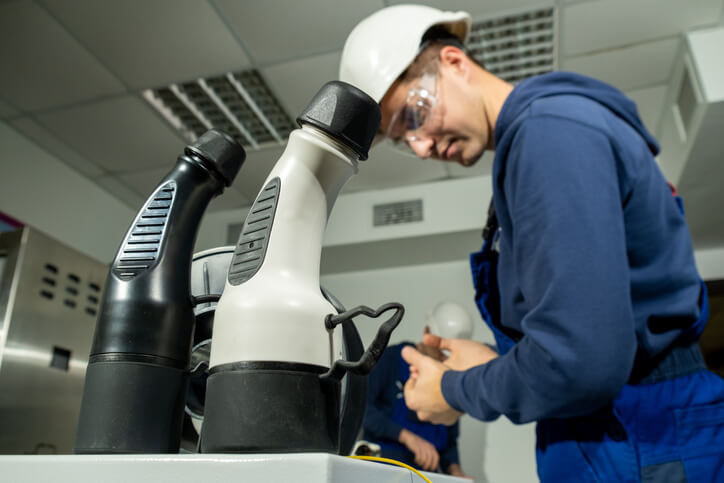EV Charging Types Explained: What Every Automotive Student Should Know
As electric and hybrid vehicles continue to grow in popularity, understanding how they’re powered has become an essential part of modern automotive education. Whether you’re aiming to become an electric vehicle mechanic or advance your knowledge through hybrid technology training, knowing the differences between EV charging types is fundamental.
At ATC Surrey, students explore the technologies shaping the future of transportation. As more electric vehicles (EVs) hit Canadian roads, understanding how they charge is one of the most important skills future technicians can possess.
Why EV Charging Knowledge Matters
EV systems are complex, and the charging infrastructure is rapidly evolving. Automotive technicians today must be familiar with various charging standards, safety protocols, and power systems. Without this knowledge, diagnosing battery performance or customer charging issues can be a major challenge.
That’s why students at our automotive school in Surrey gain hands-on experience with real EVs, learning how each charging level affects performance, efficiency, and battery longevity.
Level 1 Charging: The Slow and Steady Option
Level 1 charging uses a standard household outlet, 120 volts, and is the most basic form of EV charging. It typically adds around 5–8 kilometres of driving range per hour of charging.
For many EV owners, Level 1 charging is sufficient for overnight top-ups or short commutes. However, because it’s slow, it’s not ideal for long-distance drivers or fleet vehicles that require quick turnaround times.
From a technician’s perspective, understanding Level 1 systems is critical because they’re the foundation of all EV charging knowledge. Students in hybrid technology training learn how to assess voltage, current, and connection safety to ensure proper function and avoid overloading circuits.
Level 2 Charging: The Industry Standard
Level 2 chargers are what you’ll find in most public charging stations and private garages. They operate on 240 volts, similar to a household dryer outlet, and can provide between 25–40 kilometres of range per hour.
This type of charger strikes a balance between speed and accessibility, making it the most common for residential and commercial use.
During hands-on training, students at ATC Surrey learn to:
- Identify common connectors like SAE J1772.
- Inspect and maintain charging cables and stations.
- Troubleshoot connection or communication issues between chargers and vehicle systems.
Level 2 systems also introduce students to more complex electrical concepts like grounding, current flow, and smart charging controls—skills that prepare them for real-world service environments.

Level 3 Charging: Fast Charging for the Future
Also known as DC fast charging, Level 3 systems bypass a car’s onboard charger and send DC power directly to the battery. These powerful stations can recharge most EVs to 80% in as little as 30 minutes.
As technology advances, newer fast chargers, often rated at 150–350 kW, are making long-distance EV travel more convenient than ever.
However, with that power comes complexity. Students in hybrid technology training learn how to handle high-voltage systems safely and follow manufacturer protocols for fast-charging diagnostics. Understanding cooling systems, communication networks, and battery management systems (BMS) is vital when working on these advanced vehicles.
Beyond the Plug: The Future of EV Charging
The next wave of innovation is already on the horizon: wireless inductive charging, smart grid integration, and vehicle-to-home (V2H) energy transfer. For a future electric vehicle mechanic, these technologies represent exciting opportunities to stay ahead of the curve.
EV technicians of tomorrow will need to think beyond the wrench, combining mechanical skills with digital literacy, energy management knowledge, and diagnostic expertise.

How ATC’s Hybrid Technology Training Prepares Students
The future of auto repair is electric, and it starts with specialized education. Whether you dream of becoming an electric vehicle mechanic or leading the charge in hybrid technology, ATC Surrey offers the training to get you there.
At ATC Surrey, our hybrid technology training program bridges traditional automotive principles with cutting-edge EV education. Students gain real-world experience using diagnostic tools, high-voltage safety equipment, and advanced training simulators designed to reflect the latest industry standards. Through hands-on workshops, guided instruction, and lab exercises, students graduate ready to meet the growing demand for skilled EV technicians across Canada’s automotive sector.
Would you like to explore programs at our automotive school?
Contact ATC Surrey for more information.


